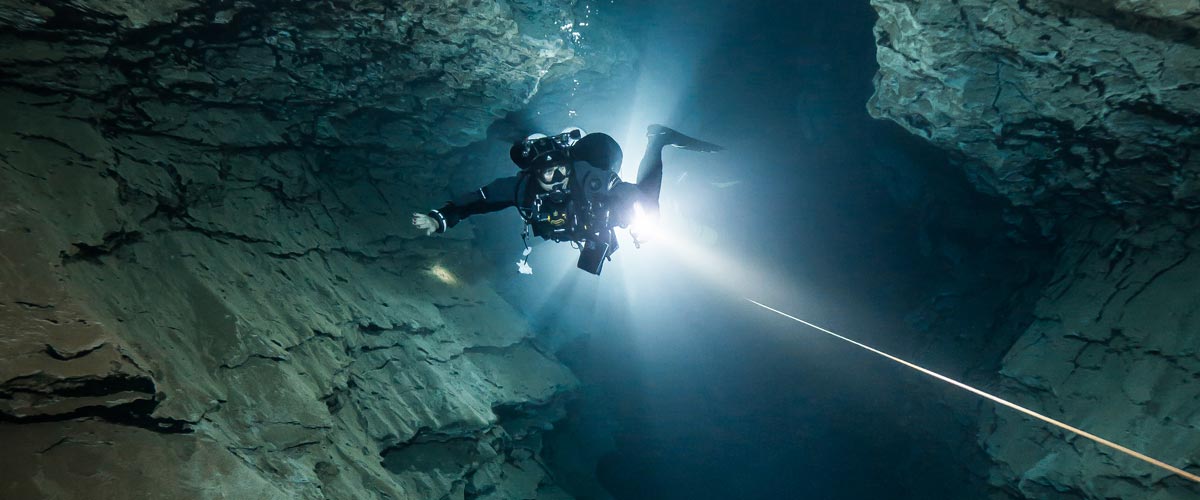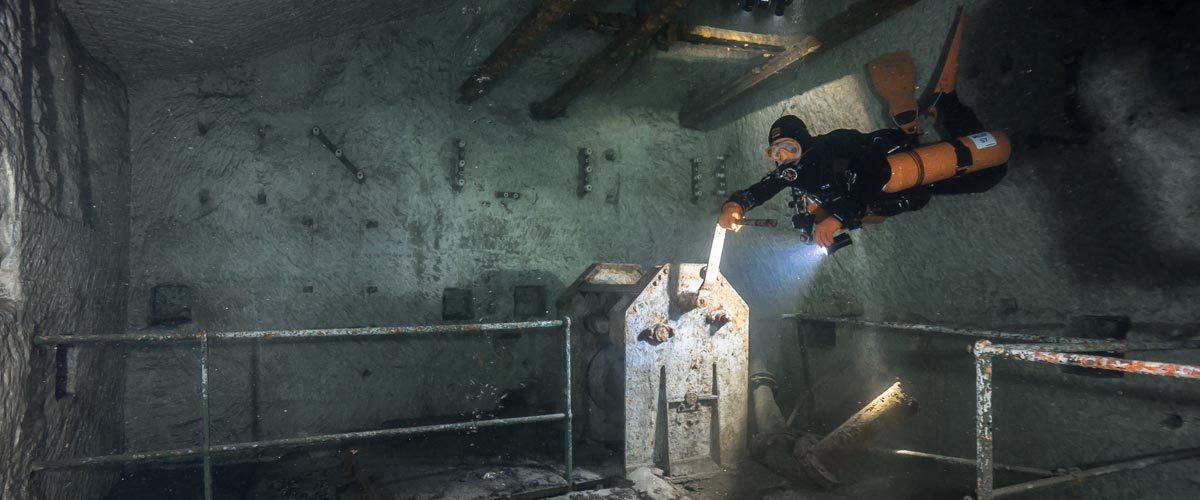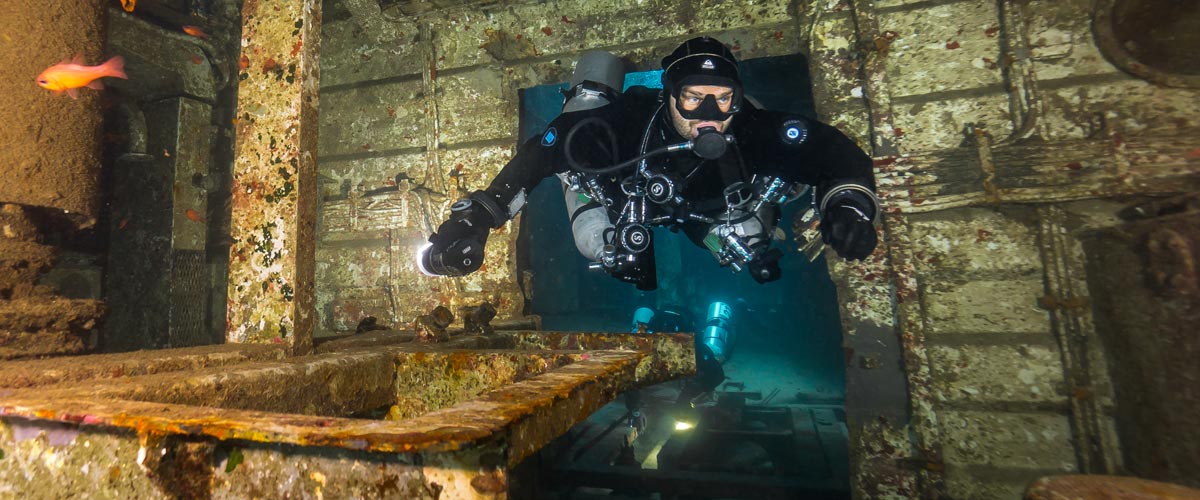Dive Training Blogs
Winter is coming: Staying warm while diving in winter
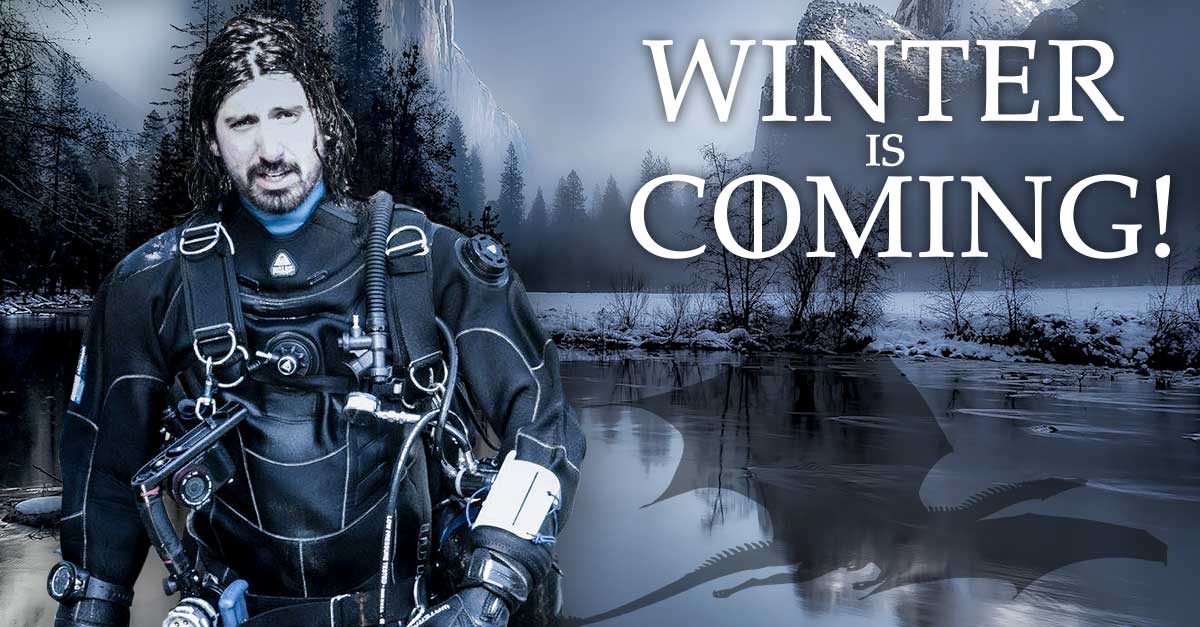
By Gemma Smith
Winter is indeed coming. There is no denying it, as much as we all may like to. People used to joke to me that if I went to live on the sun itself I’d STILL be cold. Yes, I am *that* person, who even in the height of summer always wears big woolly jumpers and doubles up on their socks. I am a self-confessed temperature wimp. More of a sunny Kings Landing girl than a Winterfell native. Nothing makes me miserable like being cold does. There is only one tiny problem with all of this. I am obsessed with cold water diving locations.
Yes, warm water and sunshine is all well and good, but can anything compare to a perfectly preserved shipwreck lying in the 2-degree water that has helped ensure it stays pristine? Or traveling around Scandinavia having to clear away the snow that will allow you to reach your dive site? Or perhaps just keeping your skills fresh and sharp over this winter, practising in your local dive spot throughout the holiday season? I think not. Over the years I have learned, through trial and error, the best ways to stay warm when diving.
With the inevitable onslaught of the colder weather ‘North of the Wall’ coming to us, here are my top five pieces of advice for my fellow temperature-challenged buddies:
Dry is the way forward
If at all possible, consider going down the drysuit route. Yes, its one more course to take, and more expense, but I truly believe its one of the best diving decisions I have ever made. As someone who learned to dive in February, in the UK, in a wetsuit, I speak from experience. I loved diving, but I was thermostatically miserable. As soon as I went down the drysuit route my diving suddenly all made sense. I was so much more comfortable, and therefore happier and more enthusiastic. No one gets into this sport to be miserable after all. If you just don’t want to go down the drysuit avenue, get yourself a proper semi-dry wetsuit. Make sure it fits you properly, is an appropriate thickness for the water temperature you will be diving in, and if at all feasible make sure you layer up.
Don’t forget the extremities!!
Yes, perhaps not the most glamorous look in the world, but always wear a hood. A bad hair day afterward is a trivial price to pay for a good, safe, and thermally comfortable dive. Humans lose a surprising amount of body heat through their heads. It is so important to limit this as much as possible. A proper 5mm-7mm neoprene hood is an easy way to maximise winter diving fun. As for the hands, a good pair of 5mm gloves at the very least is a must. And for those diving drysuit, drygloves are an absolute gift! Not only are cold hands not at all pleasant, but they will lose dexterity and possibly interfere with your ability to do basic tasks underwater. Definitely not something the safe and conscientious diver wants.
Consider your Surface Interval
While one dive in even the coldest water is great, it is the hanging around on the surface waiting for dive two that can really spoil your day. Especially for those of you diving wetsuit, it is so important to get out of it, get dried off, get changed into warm, dry, fresh clothes, and let your body’s temperature return to normal. Even if you plan on doing a second dive, ensure you always get out of wet gear. Cold water combined with a cold surface temperature and possible wind chill all added together is not going to do anyone any favours. Your surface interval is your chance to regain your energy. Make sure you do all you can to give yourself the best chance for a fantastic second dive. Beginning a dive already chilly is a big no-no. Get thermally comfortable in between submersions.
Think of what goes into your body
While eating properly and staying hydrated is always important, it becomes even more so when diving in colder conditions. Your body will burn yet more calories than normal while trying to maintain and generate heat for you. Make sure you fuel yourself properly for your day of diving. Hot drinks throughout the day and a warm, slow-releasing carbohydrate meal before a dive will do wonders. Believe me, your body will thank you if you do.
If in doubt, call the dive
No one gets a prize for sticking it out until the end of the dive if you aren’t enjoying yourself. That isn’t what this sport is about. If you start shivering uncontrollably, either before or during a dive, call it. Simple as that. Never feel bad about ‘ruining’ or shortening your buddy’s dive. Chances are if you are getting cold, they are too. There is always another day, and another dive, to experience. Uncontrollable shivering is a worrying sign of hypothermia. This can cause all kinds of issues, both physical, mental, and specifically diving related. Don’t put yourself, or your dive buddies, in that position. I’ve called plenty of dives in the past for a whole array of reasons. I don’t regret a single one of those missed dives. Listen to your body and your mind and act accordingly. That is what marks you out as the safe diver that you are.
To find out more about International Training, visit www.tdisdi.com.

Blogs
Intro to Tech: What is it about?
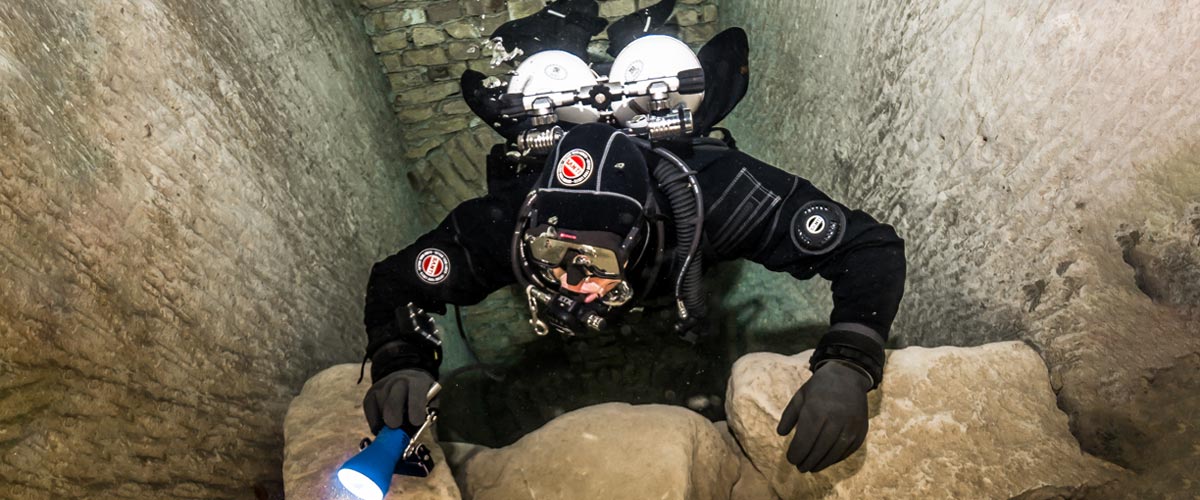
Article by José Pablo Mir
Pictures by Cezary Abramowski
The world of technical diving is exciting. It opens the door to new sites, depths, and bottom times. More importantly, it opens our minds to a new way of planning, facing, and experiencing dives, even those not purely technical.
Becoming a technical diver is a process, and like in other aspects of life, we should find the proper entry point that suits us best based on our knowledge and experience. The Introduction to Technical Diving course from TDI -the world’s largest and most recognized technical diving teaching organization- is the best option for divers who have yet to gain experience in the fundamental aspects of this new practice. The course’s content and its embrace of new techniques and technologies make it possible to acquire a solid foundation to learn and gain experience in this practice properly.
Becoming a technical diver is not something that happens overnight, whether deciding to become one or receiving a certification card stating we are now technical divers. It is a slow process extending farther away than any introductory course. It requires effort and dedication. But it will bring us satisfaction from day one -or two.
It is a matter of mentality
First, we must understand and accept that technical diving, involving greater depths, longer bottom times, exotic gases, virtual or real ceilings, and more, comes with higher levels of risk than the sport diving we have been practicing until now.
Although this discussion usually starts with a warning about risks, as I’ve done in the previous sentence, our practice is not a game of chance.
Technical diving is a rational activity that requires maturity and good judgment, and we will put everything into ensuring that each dive is a successful one -meaning we return from it safe and sound. With this understanding, we will strive to establish a mental attitude more aligned with our practice and its realities.
This new “technical diver” mindset we will develop will lead us to be more cautious in our executions, more analytical in our plans, more rational in our strategies, and more detailed in our procedures.
Experience will keep teaching us to know ourselves better, to keep our anxiety and other emotions under control, and to manage our impulses. Over time, our senses will sharpen, and we will be more attentive to the particulars of the situation we find ourselves in.
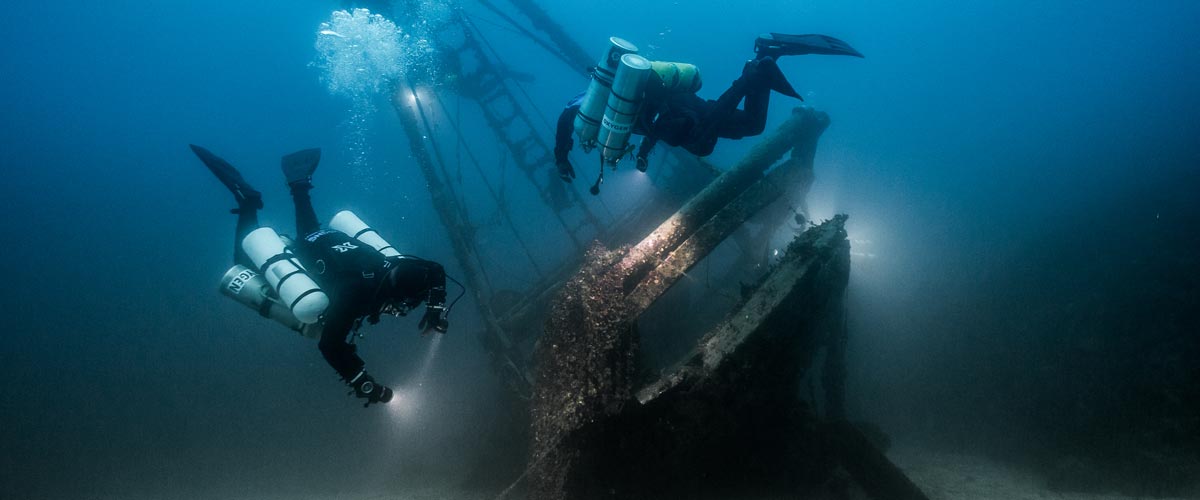
Strategies and procedures
Our strategies, those broad guiding lines tracing the path to follow, from how to approach planning to where, with what, and how we are willing to get there, will be more specific and more practical. Not because they magically become so, but because we will consciously and deliberately frame them that way.
We will establish clear, concise, and realistic procedures. Not only for the undesirable situations that may present themselves but also for those that are part of our dive objectives.
Even though, as technical divers, we often use equipment different from what we were previously accustomed to, it is essential to note that the gear does not make the diver. In a way, we could consider such equipment as the necessary tools to implement what our goal seeks to achieve, according to our strategies and procedures.
Technique plays an important role
We must put our greatest effort into learning and perfecting the different techniques we will be acquiring. Buoyancy, trim, propulsion, cylinder handling, deploying DSMBs and lift bags, valve drills, and more are essential skills we must begin to master to progress in our art. What we cannot do, when we need to do it, can harm us.
Our techniques must be effective and achieve the purpose for which they were devised. But they must also be efficient and require the least resources possible, including the time they take and the effort they demand. Effectiveness and efficiency will prevail over beauty and other considerations that may come to mind, although none of them should be mutually exclusive. A technique executed efficiently and effectively tends to have an inherent beauty.
Refining techniques is a lifelong mission. Some of them will be easy to master from the go; others, on the other hand, will be our life mission and will require many repetitions just to resemble the idea we have in mind of how they should be executed.
We must consider the environment
Our learning, the needs and musts of the practice we engage in, the experience we gradually gain, our strategies and procedures, and even our equipment and tools change with the environment.
Diving in the ocean, everything about us must be suitable for ocean dives. Conditions there rarely emulate those found in a pool, lake, or river. Variable winds and currents, greater depths, visibility conditions, other divers with uncertain skills around us, marine life, maritime traffic, distance from the coast, and many other factors add complexity and uncertainty.
It is never necessary to master the pool on the first day, but planning and aspiring to gradually cope with the ocean’s conditions is essential.
The cost of good training
We are aware that our resources are often scarce in relation to the possibilities of use we could give them if they were not. To a greater or lesser extent, we are part of the economic reality in which we are embedded.
Fortunately, the cost of good technical diver training is not an entry barrier. Comparing training and equipment costs, we see that the former are generally lower. Yes, lower cost for personalized service, essential to our future
performance and safety, than for a series of mass-produced products that are mere, albeit necessary, tools for an end.
The value of good training
The value of the training we received encompasses a range of characteristics, from emotional and methodological to technical and technological. TDI and its Introduction to Technical Diving course offer a deep and modern approach, with a teaching strategy that aims to create thinking divers, not merely obedient ones.
As technical divers, our knowledge is our primary tool. In this type of activity, what we don’t know can harm us.
Is this course optional?
Unfortunately, the fact that this Introduction to Technical Diving course is not a prerequisite for any subsequent training is an invitation to consider it optional. And we all know what usually happens to “optional” under budget constraints.
However, this course should be seen as optional only by those divers who are somehow familiar with the use of technical equipment, who have a mindset more in line with the requirements of this type of diving, who plan and execute the dives the proper “technical” way, who know their gas consumption rate, who are not intimidated by non-decompression tables, who feel comfortable using their dive computers, and know the techniques and have at least an acceptable level of buoyancy, positioning, and propulsion. Those can go straight to a more advanced training course, such as TDI’s Advanced Nitrox.
We must ask ourselves whether or not we are in that group.
Remember our goal: to have fun
Recreational diving is our passion. Jumping into the water carrying heavy equipment and having properly dotted our I’s and crossed our T’s have only one ultimate goal: fun. This is the activity we have chosen as a hobby. We must enjoy it; it must give us pleasure and make us vibrate.
Having a good time is not optional!
Blogs
Four opportunities to go pro in 2024 with Dive Friends Bonaire
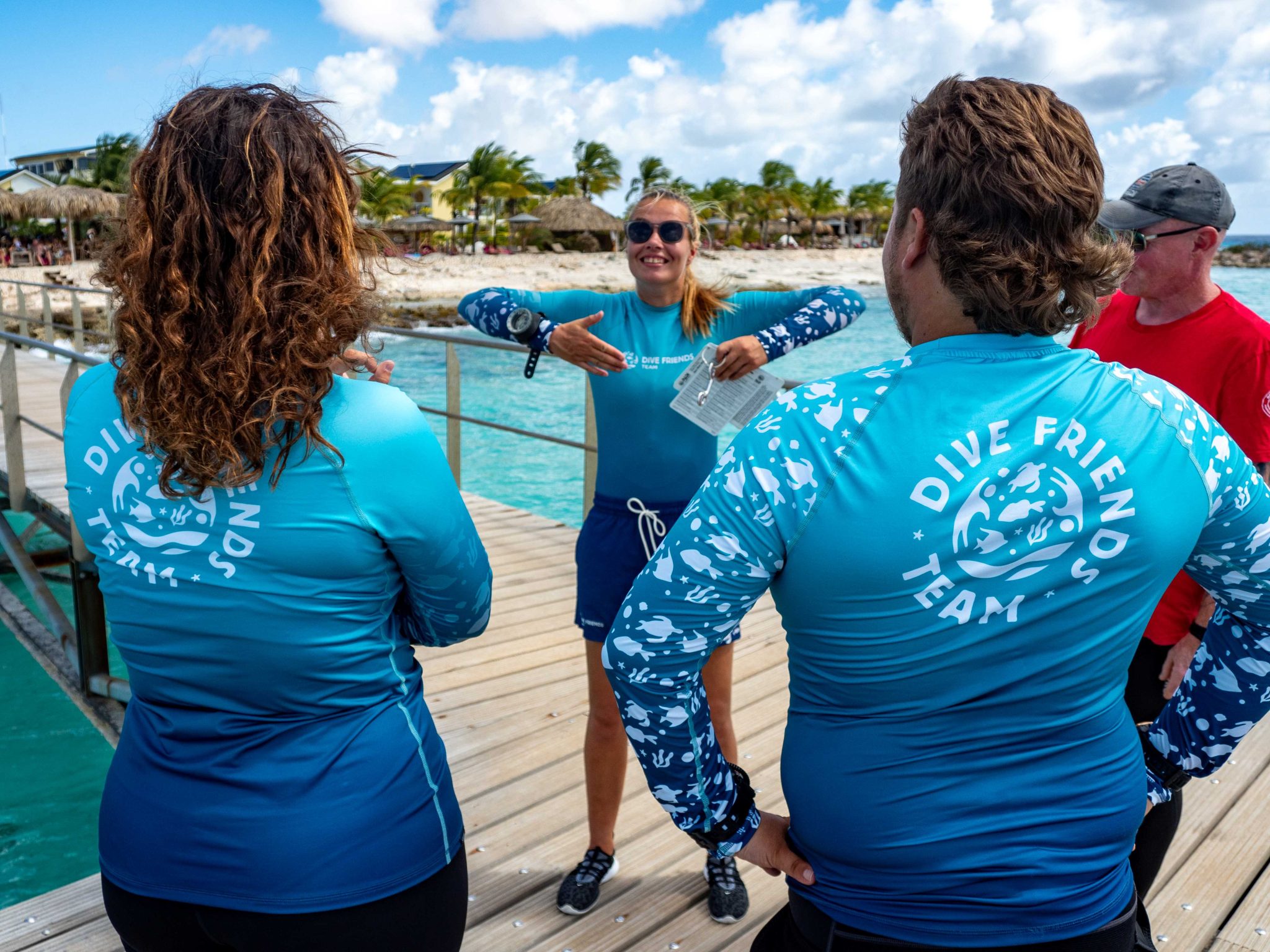
Dive Friends teaches the Instructor Development Course (IDC) several times a year to students who are eager to share their passion for diving with the world.
Dive Friends is known for the personal approach throughout the course. Their in-house course director will lead the students through every essential step, mentoring them to achieve their fullest potential as a dive instructor.
Applications for the following IDC start dates are now open:
- 12 April
- 5 July,
- 20 September
- 29 November
Partnership with Casita Palma
If the student opts for the IDC-Deluxe or IDC-Supreme package, their accommodation will be arranged for them at Casita Palma. This small and quiet resort is within walking distance from Dive Friends Bonaire’s main dive shop location and has everything you need to relax after an intense day of IDC training. Breakfast is included, so the student will always be fuelled and ready for their day.
Contact Dive Friends Bonaire’s Course Director Eddy for more information: coursedirector@divefriendsbonaire.com.
-

 News3 months ago
News3 months agoHone your underwater photography skills with Alphamarine Photography at Red Sea Diving Safari in March
-

 News3 months ago
News3 months agoCapturing Critters in Lembeh Underwater Photography Workshop 2024: Event Roundup
-

 Marine Life & Conservation Blogs2 months ago
Marine Life & Conservation Blogs2 months agoCreature Feature: Swell Sharks
-

 Blogs2 months ago
Blogs2 months agoMurex Resorts: Passport to Paradise!
-

 Blogs2 months ago
Blogs2 months agoDiver Discovering Whale Skeletons Beneath Ice Judged World’s Best Underwater Photograph
-

 Gear Reviews3 months ago
Gear Reviews3 months agoGear Review: Oceanic+ Dive Housing for iPhone
-

 Marine Life & Conservation2 months ago
Marine Life & Conservation2 months agoSave the Manatee Club launches brand new webcams at Silver Springs State Park, Florida
-

 News3 months ago
News3 months agoWorld’s Best Underwater Photographers Unveil Breathtaking Images at World Shootout 2023















